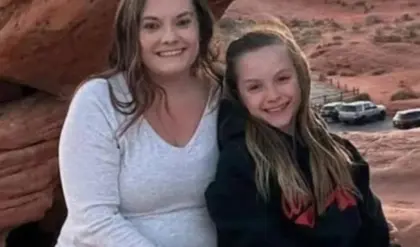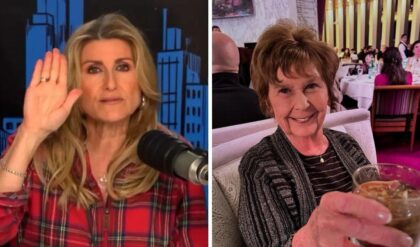Love it or hate it — and responses run the gamut — “Monsters: The Lyle and Erik Menendez Story” was one of the biggest, buzziest TV shows of 2024.
Ryan Murphy and Ian Brennan’s second installment of the “Monster” anthology (following the first season about Jeffrey Dahmer) dives deep into the story of brothers Lyle and Erik Menendez (played by Nicholas Alexander Chavez and Cooper Koch), who shot and killed their parents in 1989 and told the jury that they were protecting themselves after years of abuse.
Following a November 10 screening of Episode 1 “Blame it on the Rain,” in New York City, cast members Chavez, Koch, Javier Bardem, Chloë Sevigny, Nathan Lane, and Ari Graynor sat down for a discussion about their roles and about bringing this complex story to life.
“I went into it with the what I believe was the truth of the situation, and that is that they killed their parents out of fear,” Koch said “They had to be ready to protect themselves in case their parents were going to do the same thing to them, which I don’t think was ever gonna happen, but in their minds they believed that was gonna happen.”
For Bardem, decades of experience in film prepared him to not over-rehearse.
“When you prepare a movie, you’re by yourself,” he said. “You’re at home. You’re imagining things by yourself. You are all alone… and it can get very can get very nasty, because then you go to the set with your whole thing done, and the set is something else. Everybody’s bringing their own homework, and you have to go, like, ‘Hold on, hold on, but I thought it was going to be this way,’ — it’s alive. It’s something that you have to be prepared to go with.”
Koch said that he learned from that spontaneity, that it gave him more freedom to go with the flow on set and see what each day’s work would bring. Bardem praised both Koch and Chavez for “their commitment, their preparation, their vulnerability, their will to go as deep as it was needed… what is coming to them is going to be amazing, because they deserve it. They are great actors, but most of all, they are great human beings, and that’s why they are [such] good actors. And I am very proud to be one of the your first steps in this.”
Chavez said that he viewed Lyle Menendez as “a masked character,” almost like a child pretending to be an adult.
“He starts the series by needing to emulate nearly all of his father’s behavior,” he explained. “It’s really hard when developmentally you feel like a 10-year-old boy, and then you feel it necessary to present as a big, successful record label executive, despite not having the actual nurturing that would go along with that. It’s interesting to watch the mask slip over the course of Episodes 1, 2, 3, and 4, and then eventually you kind of see the child underneath.”
A prime visual symbol of that was the toupee that Lyle is revealed to be wearing from as early as Episode 1, ripped violently from his head by mother Kitty (Sevigny). Later on, a flashback shows father José (Bardem) taking Lyle to get it fitted, insisting that his son wear the hairpiece even though he has doubts.
“I always thought of that as being kind of like the last little bit of his authentic individuality that went to die that day,” Chavez said. “And then what do you do after that? What do you make of yourself?”
Bardem and Sevigny’s research looked different from the others, since their characters were long gone before the famous Menendez brothers trial, sentencing, and all the drama that unfolded around the brothers.
“There was not much to look for out there, to learn from José Menendez,” Bardem said, referring to how his costars were able to pore over hours of trial footage. “There was no audio, there’s no videos, there’s nothing. So I really rely on on the material… I have to play José in a way that is ambivalent. We know for certain that he did certain things, and we don’t know about others. That’s a good fun place to be as an actor, to not be able to go one side or the other, but to be in the middle.”
Bardem described José Menendez as “machista”; raised with a picture of masculinity that many now recognize as toxic and harmful, and with which Bardem is familiar. “I’ve been raised into that and it’s something that I fight against every day in my life,” he said. “My father was a product of that education. And I don’t know about here, but in Spain, there are murders every month of men killing their wives because they are super macho men, and that’s what they do, and it’s fucking disgusting. We are still prisoners of that education, and we have so much to learn.”
 (Left to right): Nicholas Chavez, Chloë Sevigny, Javier Bardem, and Cooper Koch in ‘Monsters: The Lyle and Erik Menendez Story‘Courtesy Netflix
(Left to right): Nicholas Chavez, Chloë Sevigny, Javier Bardem, and Cooper Koch in ‘Monsters: The Lyle and Erik Menendez Story‘Courtesy Netflix
Graynor, who plays Erik’s attorney Leslie Abramson, joined the project without reading the scripts — only her two audition scenes.
“That was when you first meet Leslie at the adoption agency, and when she meets Erik for the first time,” she recalled, noting the thread of compassion in both. “The show is asking a nature/nurture question that I think as an actor, you’re also always asking yourself and trying to build out your own sense of history from that person.”
Graynor and Koch are the only two to appear in Episode 5, “The Hurt Man,” a 33-minute single take that has been causing Emmys buzz since the day it aired. The episode placed immense pressure on Koch as the camera slowly pushes in closer and closer on his face, but the actor delivers — though he struggled at first.
“We did one rehearsal, and it just couldn’t have gone better,” Koch said. “Okay, we’re gonna go into this, and we’re gonna do it, and it’s gonna be great, and I’m gonna get on the first take, and then we’re gonna stop, and then we’re not gonna have to do it anymore. And the first two takes were just… oh, I felt terrible about them. I’m sure they weren’t that bad, but I just didn’t feel like I had gotten it.”
Koch took director Michael Uppendahl aside during the lunch break, who told him to stop “chasing the dragon” — recreating the magic of that rehearsal and the feeling it gave him. Uppendahl encouraged Koch to be open, defend the parents, and find light in a script with no dearth of darkness.
“Then that third take was really explosive and amazing,” Koch said. “They didn’t choose that one.”
Graynor’s face is never visible as she sits opposite from Koch at a table, but Leslie regularly asks questions, interjects, and offers kind words and validation for her client. Graynor said her theater background helped ground her performance even as she slips out the frame.
“I find the most offensive thing a director can say to an actor to be ‘Save it for the close up,’” she said. “Drives me so crazy because it suggests that you’re just doing something only for yourself and only for the camera, which to me takes away the magic of what we get to do, which is be with each other and create something and be there for each other.”
Ultimately, she said, she was grateful to witness Koch performing “the most difficult piece of work I’d ever been a part of or seen.”
“There was so much trust and so much love and so much prep, and then to see what he did every time we did it — and we never stopped, we never broke,” Graynor added. “It was an extraordinary experience, and one of the most pure artistic experiences I’ve had in a way — maybe because there wasn’t a camera, so it was just about inhabiting the space together.”
As Koch said: “I was your camera.”


